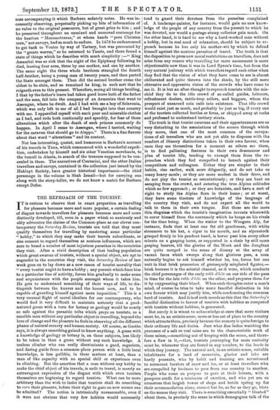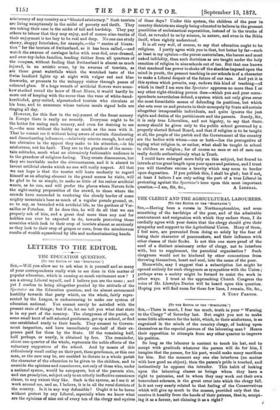THE REPROACH OF THE TOURIST.
TT is curious to observe that in exact proportion as travelling I for pleasure becomes more and more popular, a certain feeling of disgust towards travellers for pleasure becomes more and more distinctly developed, till, even in a paper which so anxiously and ably advocates the claims of the Common-place as our clever con- temporary the Saturday Review, tourists are told that they must qualify themselves for travelling by mastering some particular -4' hobby," to which they may make their travels subordinate, or else consent to regard themselves as noxious influences, which are sure to breed a number of most injurious parasites in the countries they visit. After a vivid description of that loafing population which great swarms of tourists, without a special object, are apt to -engender in the countries they visit, the Saturday Review of last week goes on to lay down as a new canon of tourist morality that -" every tourist ought to have a hobby ; any pursuit which fixes him to a particular line of activity, forces him gradually to make some Teal acquaintance with the people amongst whom it takes him. He gets to understand something of their ways of life, to dis- tinguish between the knaves and the honest men, and to be -capable of guarding himself against mere imposition." This is a very unusual flight of moral idealism for our contemporary, who would find it very difficult to maintain seriously that a good- natured goose with a turn for botany or geology would be nearly so safe against the parasitic tribe which preys on tourists, as a sensible man without any particular object in travelling, beyond the love of change and the pleasure he feels in observing all the different phases of natural scenery and human society. Of course, as Goethe says, it is always something gained to know anything. A goose with a knowledge of geology or botany is, on these subjects, less likely to be taken in than a goose without any such knowledge. A zealous climber who can really discriminate a good, sagacious, and daring guide from a common-place person with a little local knowledge, is less gullible, in these matters at least, than a man of like capacity with no special skill or experience even in climbing. But the assertion that a man without any hobby to make the chief object of his travels, is unfit to travel, is merely an extravagant expression of the disgust with which even tourists themselves are beginning to regard tourists. What can be more arbitrary than the wish to insist that tourists shall do something to earn their pleasure, before their right to gaze on new scenes can be admitted ? The notion is intrinsically unreasonable, even if it were not obvious that very few hobbies would necessarily
tend to guard their devotees from the parasites complained of. A landscape-painter, for instance, would gain no new know- ledge of the people of any country from the pursuit to which he was devoted, nor would a postage-stamp collector gain much. On the other hand, it is hard to see why a hard-worked man without a hobby, but in real need of relaxation, should be subject to re- proach because he has only his mother-wit by which to defend himself against the noxious parasites of travel. The truth is that the disposition to press new moral restrictions on travellers, does not arise from any reason why travelling for mere amusement is more objectionable now than it was in Lord Byron's time, but from the very natural jealousy with which travellers regard each other when they find that the vision of what they have come to see is almost obliterated and quite thrown into the shade, by the still more obtrusive and oppressive vision of the crowds who have come to see it. It is but an after-thought to reproach tourists with the mis- chief they do to the idle crowd of so-called guides, loiterers, refreshment dealers, rattle-trap sellers, and beggars, whom the prospect of unearned coin calls into existence. That idle crowd would exist just as much, and probably be just as big, if every one of the tourists collected beetles or ferns, or chipped away at rocks and professed to understand tertiary strata.
The truth is that tourist caravans and their appurtenances are so very disturbing to the associations of the scenes through which they move, that one of the most common of the occupa- tions of all travellers who are not yet able to dispense with the comfort of illusory distinctions taken in their own favour, when once they see themselves for a moment as others see them, is to find palliating features in their own demeanour and plan of tourist life, tending to exempt them from the re- proaches which they feel compelled to launch against their competitors and colleagues. Either they are simpler in their habits, rise earlier, walk more diligently, and do not take so many heavy meals ; or they are more modest in their dress, and do not play the tourist so ostentatiously ; or they are bent on escaping from the crowd, and entering the true Alpine solitudes which so few approach ; or they are botanists, and have a sort of right to study the Alpine flora in their home ; or at worst, they have some tincture of knowledge of the language of the country they visit, and do not expect all the world to talk to them in their own tongue. But these are the mere thin disguises which the tourist's imagination invents wherewith to cover himself from the contumely which he heaps on his rivals for the time being. When the visitor to the Wengern Alp, for instance, finds that at least one fat old gentleman, with white streamers to his hat, a cigar in his mouth, and an alpenstock grasped firmly in his pendent hand, is borne past him every other minute on a gasping horse, or supported in a chair by still more gasping bearers, till the glories of the Monk and the Jungfrau are quite merged in the sense of dismay at the array of vacant faces which sweeps along that glorious pass, a man naturally begins to ask himself whether he, too, forms but one unit in that brisk procession of grotesquely misplaced figures,— brisk because it is the arterial channel, as it were, which conducts the chief personages of the early table d'hôte on our side of the pass in time for the late table d'hôte on the other, and prepares them for it by oxygenating their blood. When such thoughts enter a man's mind, of course he tries to take some fanciful distinction in his own favour which may justify him, while condemning the common herd of tourists. And it is of such moods as this that the Saturday's fanciful distinction in favour of tourists with hobbies as compared with tourists without hobbies, is generated.
But surely it is wisest to acknowledge at once that mere visitors must be, in an artistic sense, more or less out of place in the country which attracts them, precisely because the scenery is quite foreign to their ordinary life and duties. Just what fine ladies watching the processes of a salt or coal mine are to the characteristic work of those mines,—something out of keeping with the scene, and there- fore a flaw in it,—that, tourists journeying for mere curiosity must be, whenever they are found in any number, to the lands in which they journey. The natural and, in an artistic sense, suitable inhabitants for a land of mountain, glacier and lake are hardy peasants, who by habit and training are accustomed to surmount barriers of snow and ice, or at least travellers who are compelled by business to pass from one country to another. People who come on purpose to gaze at their leisure, with a pompous outfit for a minimum of exertion, and who yet are so numerous that largish towns of shops and hotels spring up for their accommodation alone, cannot but be, so far as they go, blots on the scenes they visit. There is something essentially " bloated" about them, in precisely the sense in which demagogues talk of the aristocracy of any country as a "bloated aristocracy." Such tourists are living sumptuously in the midst of poverty and thrift. They are taking their ease in the midst of toil and hardship. They pay others to labour that they may enjoy, and of course nine-tenths of their enjoyment is too lazy to be real and deep. No one can study showy, choppy Interlaken, for example,—the " centre of bloata- tion " for the tourists of Switzerland, as it has been called,—and watch the swarms of carriages laden with over-fed, over-dressed, and over-toy-laden families, tending thither from all quarters of the compass, without feeling that Switzerlaiid is almost as much injured, in an artistic sense, by its swarms of tourists, as are those great waterfalls which the wretched taste of the Swiss landlord lights up at night with vulgar red and blue fireworks, or presents to the unhappy visitor through panes of coloured glass. If a huge wreath of artificial flowers were some- how stacked round the brow of Mont Blanc, it would hardly be more out of keeping with the scene than the vans of white-hand- kerchiefed, grey-suited, alpenatocked tourists who circulate at his base, and to announce whose various meals signal bells are ringing all day.
However, for this flaw in the enjoyment of the finest scenery in Europe there is really no remedy. Everyone ought to be the better for seeing such scenery, and even for desiring to see it,—the man without the hobby as much as the man with it. That he cannot see it without being aware of certain discolouring and disenchanting influences,—relatively minute enough, but only too obtrusive in the appeal they make to his attention,—is hie misfortune, not his fault. They are to the grandeur of the moun- tain solitudes, much what an obtrusively fashionable audience is to the grandeur of religious feeling. They create dissonances, but they are inevitable under the circumstances, and it is absurd to invent artificial checks which no one will really respect. All that we can hope is that the tourist will learn modestly to regard himself as an alloying element in the grand scenes he visits, will be glad to be as simple, to make as little of his rather artificial wants, as he can, and will prefer the places where Nature foils the sight-seeing propensities of the crowd, to those where the crowds have succeeded in rendering the cloudy border of some mighty mountain's base as much of a regular parade ground, or, so to say, as brocaded with artificial life, as the gardens of Ver- sailles or Potsdam. If be does this, he will do all that we can properly ask of him, and a great deal more than any zeal for hobbies can ever be expected to do, towards protecting those countries which look to their crop of tourists almost as anxiously as they look to their crop of grapes or corn, from the mischievous results of wealth squandered by idle and undiscriminating hands.































 Previous page
Previous page